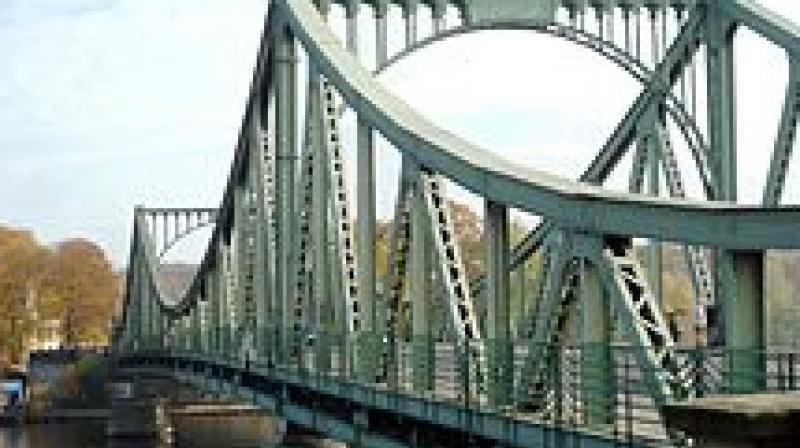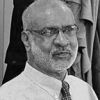Spy meets spy on Berlin's Glienicke Bridge

In the autumn of 2010, Vikram Sood, retired RAW chief, and myself were in a conference at Potsdam organised by the Rosa Luxembourg Stiftung. As the conference was winding down, the hosts asked the Indian team if there was anything particular we wanted to do before leaving for India, and the Chief and I suggested a visit to the Glienicke Bridge, where the first great spy exchange took place between the US and the Soviet Union. It was a cold and grey October and we were wearing overcoats. It was just the right setting for spies coming in from the cold.
Glienicke Bridge is a bridge across the Havel River in Germany, connecting Berlin’s Wannsee district with Brandenburg’s capital Potsdam. It is named after the nearby Glienicke Palace.
The first spy exchange took place in February 1962, when the Americans and Russians exchanged Col. Rudolf Abel of the KGB for Maj. Francis “Gary” Powers of the CIA. Both were symbols of two great and successful spy operations undertaken by the two powers. This was later made into the film Bridge of Spies, directed by Steven Spielberg, with Tom Hanks as the lawyer, and James Donovan as the man who facilitated the exchange. Mark Rylance as Rudolf Abel won the Oscar for the supporting role in 2016.
Abel was a Russian “illegal”, meaning a Russian agent with a false but artfully created legend. It usually started with a visit to cemeteries to search for identities of boys or girls who died early and to match the age of the agent. Based on this, a complete identity was created with superbly forged documents to support a carefully crafted timeline. Many of the illegals were “sleepers”, who would be woken up when a job was required to be done and required their expertise and skills. How many “sleepers” the KGB had installed in the West can never be known. The series The Americans, which scored big in the Emmy awards recently, is about a group of Russian-Americans “illegals” operating in the United States. It ran for six seasons.
But Rudolf Abel was clearly at the top of the pyramid. He is believed to be the agent who handled the “atomic spies”, Julius and Ethel Rosenberg, and Vivian Fuchs, who worked on Project Manhattan, the super-secret American nuclear bomb programme in Los Alamos. The Russians, wartime allies of the US, were kept so well abreast of the programme that when the Trinity explosion was triggered off at Alamogordo on July 16, 1945, the allied leaders were scheduled to meet at Potsdam for a conference the following week. The first nuclear test was still a well-kept secret.
Rudolf Abel entered America with a genuine birth certificate, a forged draft card and a forged tax certificate, all under the name of Emil Robert Goldfus, along with $1,000. The real Goldfus had died at only 14 months, having been born on August 2, 1902, in New York. The forerunner of the KGB, the NKVD, obtained Goldfus’ birth certificate. The illegals programme was the jewel in the crown of Soviet intelligence operations.
At the Potsdam Conference, however, President Harry S. Truman chose to tell Stalin only that the US possessed “a new weapon of unusual destructive force”. This was Truman’s account: “On July 24 I casually mentioned to Stalin that we had a new weapon of unusual destructive force. The Russian Premier showed no special interest. All he said was he was glad to hear it and hoped we would make ‘good use of it against the Japanese’.”
But Stalin knew, and the Russians were getting a good deal of information from Project Manhattan. They were ready in four years. The first Soviet atomic test was codenamed Pervaya Moiniya — or First Lightning — and took place at Semipalatinsk in Kazakhstan on August 29, 1949. The Americans codenamed it as “Joe 1”. The design was very similar to the first US “Fat Man” plutonium bomb, using a TNT/hexogen implosion lens design.
In the same year the Russian nuclear physicist Andrei Sakharov developed a design for a layered fission-fusion-fission bomb and called it the “sloika”, or layered cake. It was also known as the RDS-6S, or Second Idea Bomb. The RDS-6S layer cake design was detonated on August 12, 1953, producing a yield of 400 kilotons, about 10 times more powerful than any previous Soviet test.
The Americans tested their first fusion or hydrogen bomb on March 1, 1954. Castle Bravo was the first in a series of high-yield thermonuclear weapon design tests conducted by the United States at Bikini Atoll, Marshall Islands. The device was the most powerful nuclear device detonated by the United States and its first lithium deuteride-fuelled thermonuclear weapon and had a yield of 15 megatons.
The Russian climaxed this race with the Tsar Bomba, which was the largest, most powerful thermonuclear weapon ever detonated. It was a three-stage hydrogen bomb with a yield of about 50 megatons. This is equivalent to 10 times the amount of all the explosives used in World War II combined. It was detonated on October 30, 1961.
The U-2 spy plane programme was a great mission as it involved America’s great technical prowess and project management abilities. When the onset of the Cold War and when a near-impenetrability separated the West from the Soviet Union, which was best defined by Winston Churchill’s “From Stettin in the Baltic to Trieste in the Adriatic, an ‘Iron Curtain’ has descended across the Continent”. Little was known about what was happening behind this “Iron Curtain”, and with the bomb-building frenzy creating a huge trust void with both sides seeking information about the other and its intentions. The Soviets were more focused on American technologies, while the Americans were focused on Soviet intentions and military dispositions.
The Russians kept prying on America with human intelligence, the leading edge of this being the illegals programme. The Americans, shut out by a police state, sought to achieve their objectives by technological means. The star of this was the U-2 programme. This was the period before satellite reconnaissance and when both alliances were at hair-trigger nuclear alert and round-the-clock bomber patrols.
The CIA wanted a plane that the Russians couldn’t see or track, let alone shoot down. So it went to Lockheed’s legendary aircraft designer, Kelly Johnson, for help. Johnson gave them the Lockheed U-2, nicknamed “Dragon Lady”, a single-jet engine, ultra-high altitude reconnaissance aircraft capable of day and night, high-altitude (70,000 feet) and all-weather intelligence gathering. It could criss-cross the Soviet Union at will. The Russians could only watch helplessly. The U-2 was basically a XF-104 (an early Starfighter) with extended wings that stretched 103 feet and large fuel tanks, and highly sophisticated cameras. Shooting through seven glass encased windows in the belly of the U-2, the camera recorded everything along a 3,500 km (2,700 mile) course up to 200 km (125 miles) wide, and it could provide up to 4,000 pairs of stereoscopic photographs. The 36-inch focal length lens resolved features as small as 2.5 feet.
The U-2s flew from bases at Hakodate in Japan, Peshawar in Pakistan and Lanark in Cyprus, and ranged over Russia since 1957. Then suddenly, out of the blue, a U-2 mission from Peshawar overflying Russia and to land at Bodoe in Norway was shot down over Sverdlovsk in Russia. The pilot, Gary Powers, baled out as the crippled U-2 came down towards earth and was captured by the Russians. Incidentally, the US still operates the U-2, 71 years after it entered service.
The Russian illegals programme and America’s U-2 programme intersected for a moment when the two exchanged spies passed each other on February 10, 1962 on the Glienicke Bridge outside Potsdam.

